|
|
|
Sort Order |
|
|
|
Items / Page
|
|
|
|
|
|
|
| Srl | Item |
| 1 |
ID:
100724
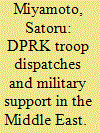

|
|
|
|
|
| Publication |
2010.
|
| Summary/Abstract |
The DPRK now trades in arms with the Middle East. However, in the October War (1973) the DPRK first began military cooperation with the Middle East by sending troops and providing unrequited military support. This switch was made to win support within the UN from these Middle Eastern countries, and so to counteract the US presence in the UN. Failing this, the DPRK withdrew from the UN in 1976. The DPRK then turned to arms trading both to build up its foreign currency reserves and to help liberate developing countries from US control.
|
|
|
|
|
|
|
|
|
|
|
|
|
|
|
|
| 2 |
ID:
102505
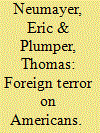

|
|
|
|
|
| Publication |
2011.
|
| Summary/Abstract |
Americans are a major target of international terrorism. Yet, terrorists from some countries are much more likely to attack American citizens than terrorists from other countries. Similarly, anti-American terrorism from a specific foreign country is much more prevalent during certain periods than others. This article develops a rational theory of international terrorism, which argues that attacking foreign nationals is of strategic value to terrorists even if they ultimately aim at gaining political influence in their home country. Attacking foreigners is the more attractive to domestic terrorists the more the terrorists' home government depends on military support from the foreign country. Applied to the US case, our theory predicts that more anti-American terrorism emanates from countries that receive more US military aid and arms transfers and in which more American military personnel are stationed, all relative to the country's own military capacity. Estimations from a directed country dyad sample over the period 1978 to 2005 support the predictions of our theory for both terrorist incidents involving Americans and terrorist killings of Americans as dependent variables. These results are robust to a wide range of changes to the empirical research design.
|
|
|
|
|
|
|
|
|
|
|
|
|
|
|
|
| 3 |
ID:
152695


|
|
|
| 4 |
ID:
132558
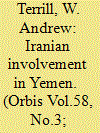

|
|
|
|
|
| Publication |
2014.
|
| Summary/Abstract |
For at least a decade, there have been numerous Yemeni, Saudi, and other countries' assertions that Iran has been involved in supporting northern Yemeni rebels seeking autonomy from the Sana'a government. Iranian diplomatic and political support for this rebellious group (known as the Houthis) is undeniable, but Iranian military assistance for them has not always been easy to prove. This situation appeared to change in 2011 when Iran's increased involvement in Yemen occurred in response to both the chaotic situation there during the final year of the Saleh regime and the danger that the Arab Spring revolutions would leave Iran increasingly isolated. Evidence of Iranian efforts to supply weapons to the Houthis now seems overwhelming in contrast to uncertain reports prior to 2011. In addition, at least some of Yemen's southern secessionists also appear to be receiving at least limited Iranian financial support.
|
|
|
|
|
|
|
|
|
|
|
|
|
|
|
|
| 5 |
ID:
155836
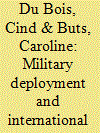

|
|
|
|
|
| Summary/Abstract |
Extant literature documents a relationship between military deployment and the risk of an international terrorist attack against citizens of the deploying country. It appears that deployment significantly increases the possibility of terrorist actions in the home country. In particular, if country A decides to send troops to nation B, then citizens of the former country are more likely to fall victim of an attack carried out by a terrorist organisation originating from the latter country. Contributing to this line of literature, we further refine this relationship by distinguishing between regions where the troops are sent as well as by introducing differences between types of deployment. Our results indicate that missions to Asia and the Middle East are more dangerous than missions to other regions as reflected by the terrorist threat in the home country. Robustness tests do however show that the significance of the location variable Asia is predominantly attributed to the mission to Afghanistan. As for types of deployment, only ad hoc missions seem to increase the risk of an attack, whereas no significant results are found for other missions such as operations under UN and NATO flag. Leaving out the missions to Iraq and Afghanistan however also increases the danger resulting from missions by fixed coalitions. Our results find however no evidence that ‘wearing a blue helmet’ increases the probability of a terrorist attack at home.
|
|
|
|
|
|
|
|
|
|
|
|
|
|
|
|
| 6 |
ID:
146504
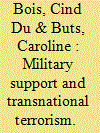

|
|
|
|
|
| Summary/Abstract |
Analysing the relationship between the provision of military support and the probability of becoming the target of a terrorist attack, this paper contributes to the literature on the causes of transnational terrorism. We find that deployment of military troops of country X in country Y increases the probability of a terrorist attack on citizens of country X by a terrorist group located in country Y. Exporting weapons to country Y seems to increase the probability of being attacked by the terrorists of this country Y as well. Deploying materials, however, does not seem to significantly influence the probability of attack. Including lagged values for our military support variables ensures that the causality direction is from military support to terrorist attacks. Moreover, these results indicate that while the effect of military deployment on the probability of attack lasts for more than 1 year, the effect is rather short-lived.
|
|
|
|
|
|
|
|
|
|
|
|
|
|
|
|
| 7 |
ID:
177839


|
|
|
|
|
| Summary/Abstract |
How does conscription influence citizens’ support for the armed forces? We argue that conscription, more so than voluntary-recruitment systems, can reach out to and socialize larger segments of the society in line with the military’s values. This, in turn, induces more positive views of the armed forces. Using a unique data set comprising information for 34 European states in 1997–2017, we find robust evidence that countries with conscription-based recruitment tend to be characterized by higher levels of support for the military. This result greatly adds to the debate about the type of military-recruitment system countries should implement: abolishing compulsory military service is usually seen as increasing efficiency and performance; yet, a positive – and previously unknown – externality of conscription that we identify is a higher degree of support by the public, which is pivotal for, inter alia, defense-policy implementation, military interventions abroad, budget considerations, or the participation in military alliances.
|
|
|
|
|
|
|
|
|
|
|
|
|
|
|
|
|
|
|
|
|